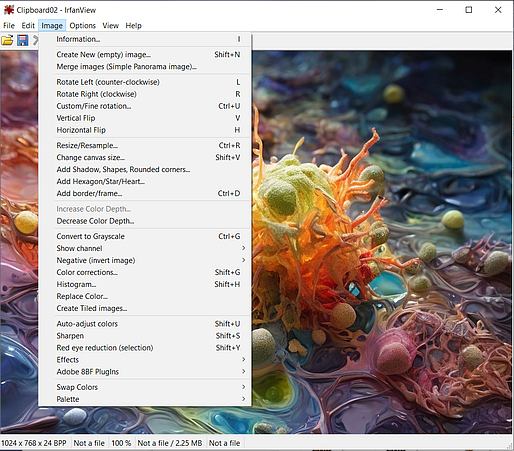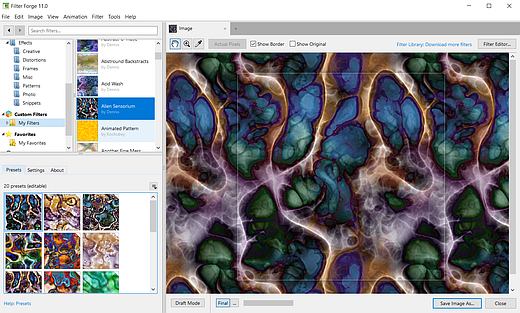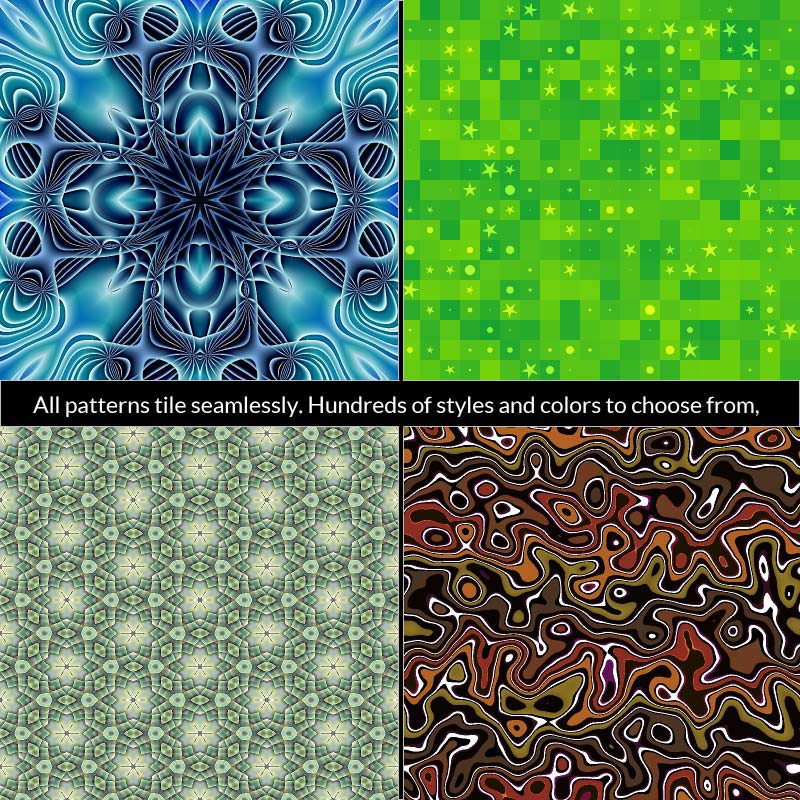Nothing is for sale here. Freewill tips keep the site running. Want to help? → Tip via Paypal
Real Product Reviews
All reviews on this site are based only on products and services I actually use. I am not an affiliate of these products or services and do not earn a commission from them. That's why you can trust these reviews to reflect my actual experience and not just blowing smoke to earn a commission. Your experience may differ from mine.Irfanview — Swiss Army Knife of Image Apps
 At its core, IrfanView is lightning fast. It launches in a blink, even when working with today’s massive multi-megapixel image files, and it uses almost no system resources. That speed makes browsing a folder full of images a joy rather than a chore, whether you’re quickly flipping through pictures or watching them as a slideshow.
At its core, IrfanView is lightning fast. It launches in a blink, even when working with today’s massive multi-megapixel image files, and it uses almost no system resources. That speed makes browsing a folder full of images a joy rather than a chore, whether you’re quickly flipping through pictures or watching them as a slideshow.
But calling IrfanView just an “image viewer” is selling it short. It’s also an editor, converter, and organizer. You can crop, resize, rotate, sharpen, and adjust colors in seconds. Need to add shapes, text, or picture frames? Done. Want to batch convert an entire folder of photos into another format, rename them, or apply the same edits across the board? IrfanView handles it with ease — and it does so faster than most of its competition.
The feature list doesn’t stop there. It can capture screenshots, scan documents, insert watermarks, and even play video and audio files. Add the optional plugin pack and suddenly IrfanView supports nearly every file type you’re ever likely to encounter, from RAW photos to PostScript to PSDs. In practice, it becomes less of an image viewer and more of a multimedia Swiss Army Knife.
Yes, the interface looks old-school. It’s functional rather than flashy, but the simplicity makes it easy to use. You can even customize what shows on the toolbar. Spend a few minutes with it and you’ll find the design is refreshingly straightforward and easy to use. Keyboard shortcuts abound, and once you’ve picked up a handful, everyday tasks like cropping, exporting, or renaming become almost automatic.
What really sets IrfanView apart is its balance of power and simplicity. Unlike heavyweight editors such as Photoshop or GIMP, it doesn’t bury you in menus or chew up your system. It’s lean, dependable, and endlessly useful for both quick edits and large-scale workflows. Whether you’re a casual user cleaning up vacation shots, or a creator managing thousands of assets, IrfanView adapts.
Bottom line: IrfanView may not win beauty contests, but it’s one of the most practical, efficient, and feature-rich tools out there. It’s free for personal use, tiny on disk, and endlessly capable. For me, it’s been indispensable for two decades — and it’s still one of the first thing I install on a new PC.
Filter Forge — Endless Creative Possibilities
 At its core, Filter Forge is about creativity without limits. The library includes over 14,000 filters — everything from natural textures like wood, stone, and fabric, to photo effects, distortions, and patterns seamless tiles and more. There are even animation effects.
At its core, Filter Forge is about creativity without limits. The library includes over 14,000 filters — everything from natural textures like wood, stone, and fabric, to photo effects, distortions, and patterns seamless tiles and more. There are even animation effects.
The real magic is in its node-based editor, which lets you design your own filters from scratch or modify existing filters. Even if you’ve never built a filter before, the interface is approachable, and experimenting is encouraged. Here are the filters I've made: All Filters by Boogie Jack.
Version 14 adds improved performance, better multi-threaded processing, and compatibility with modern systems, making complex filters faster and more responsive than ever. And while advanced features can push your CPU, the results are worth it — procedural textures are resolution-independent, so you can render massive images without losing quality.
For new users Filter Forge can feel expensive — but it’s not subscription-only. You can purchase a license outright, and the company often offers big discounts! This makes it a bit of a rare gem in today’s subscription-heavy software world: pay once, and you keep the tool forever. About the big discounts I just mentioned — as I write this you could get Filter Forge today for 50% off, but today is the last day and this review won't be published before the sale is over. I mention it so you know the sales are worth watching for.
Bottom line: Filter Forge isn’t just another effects library. It’s a creative sandbox for textures, filters, and visual experimentation. Whether you’re a photographer, 3D artist, or graphic designer, it opens doors to new looks and effects you won’t get from standard image editors. It’s a powerful, flexible, and inspiring tool — and with the current discount and free trial available, there’s no reason not to give it a spin.
Claude.AI
First Impressions
Claude is refreshingly simple to use. The interface doesn’t get in the way — it’s fast, clean, and focused. Just me and the AI, no distractions. If you’ve used ChatGPT before, you’ll feel right at home, but Claude definitely brings its own personality and strengths.When starting a chat, you can pick from three versions:
- Opus– the most capable
- Sonnet – the most balanced
- Haiku – the fastest model, optimized for short, quick answers rather than long, detailed explanations
What Claude Does Well
Claude’s answers are consistently clear and well-structured. Instead of dumping raw info, it organizes responses so they’re easy to follow — and if you’re still stuck, it will quickly re-explain in simpler terms.I’ve used Claude mainly for troubleshooting web design problems. I’m comfortable with HTML and CSS, but weaker in JavaScript and PHP. Claude has been a real help here: I can describe what I want, explain the unwanted results I’m seeing, and more often than not, it gives me a working solution on the first try. For more complex issues, it asks smart questions and walks me through a step-by-step troubleshooting process — like having a patient coding buddy on call.
Where It Falls Short
On the free plan, availability can feel a little confusing. You might be told you’ve hit your five-hour limit, but it doesn’t always line up with five hours on the clock. Usage depends on things like:
- Message length and complexity
- File attachments
- Length of the conversation
- Which model (Opus, Sonnet, Haiku) you’re using
- Overall demand on the system
Tips to stretch your time further:
- Keep chats focused — start a new thread for each topic instead of piling everything into one conversation.
- When a thread gets long, ask Claude to summarize the key points, then start a fresh chat with that summary.
- Batch related questions into a single message instead of sending them one by one.
- Edit your messages for clarity before sending. Short, well-organized prompts (like bulleted lists) help Claude give better answers and use up less time.
What Claude Can Do
Think of Claude as a serious assistant that’s free unless you choose to upgrade. Here’s what it says it can help with:Web Development & Design
- HTML, CSS, and JavaScript coding
- Responsive layouts and mobile optimization
- Interactive tools
- Forms and user interfaces
- Bootstrap and modern CSS frameworks
Content Creation
- Articles, tutorials, and documentation
- Technical explanations and how-to guides
- Creative writing (stories, scripts, etc.)
- Marketing copy and website text
Graphics & Visual
- SVG creation and editing
- CSS animations and effects
- Data visualization and charts
- Color theory and design advice
Programming & Technical
- Multiple languages (Python, JavaScript, etc.)
- Database queries and analysis
- API integration and web scraping
- Debugging and optimization
Research & Analysis
- Web research on current topics
- Data analysis and interpretation
- Fact-checking and verification
- Reviewing technical docs
Problem Solving
- Troubleshooting technical issues
- Process improvement and automation
- Custom solutions for specific needs






